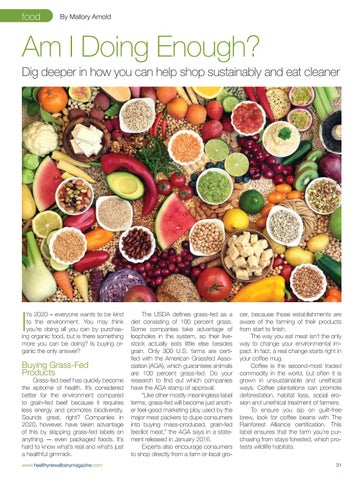food
By Mallory Arnold
Am I Doing Enough? Dig deeper in how you can help shop sustainably and eat cleaner
I
t’s 2020 – everyone wants to be kind to the environment. You may think you’re doing all you can by purchasing organic food, but is there something more you can be doing? Is buying organic the only answer?
Buying Grass-Fed Products
Grass-fed beef has quickly become the epitome of health. It’s considered better for the environment compared to grain-fed beef because it requires less energy and promotes biodiversity. Sounds great, right? Companies in 2020, however, have taken advantage of this by slapping grass-fed labels on anything — even packaged foods. It’s hard to know what’s real and what’s just a healthful gimmick. www.healthynewalbanymagazine.com
The USDA defines grass-fed as a diet consisting of 100 percent grass. Some companies take advantage of loopholes in the system, so their livestock actually eats little else besides grain. Only 300 U.S. farms are certified with the American Grassfed Association (AGA), which guarantees animals are 100 percent grass-fed. Do your research to find out which companies have the AGA stamp of approval. “Like other mostly meaningless label terms, grass-fed will become just another feel-good marketing ploy used by the major meat packers to dupe consumers into buying mass-produced, grain-fed feedlot meat,” the AGA says in a statement released in January 2016. Experts also encourage consumers to shop directly from a farm or local gro-
cer, because those establishments are aware of the farming of their products from start to finish. The way you eat meat isn’t the only way to change your environmental impact. In fact, a real change starts right in your coffee mug. Coffee is the second-most traded commodity in the world, but often it is grown in unsustainable and unethical ways. Coffee plantations can promote deforestation, habitat loss, social erosion and unethical treatment of farmers. To ensure you sip on guilt-free brew, look for coffee beans with The Rainforest Alliance certification. This label ensures that the farm you’re purchasing from stays forested, which protests wildlife habitats. 31














